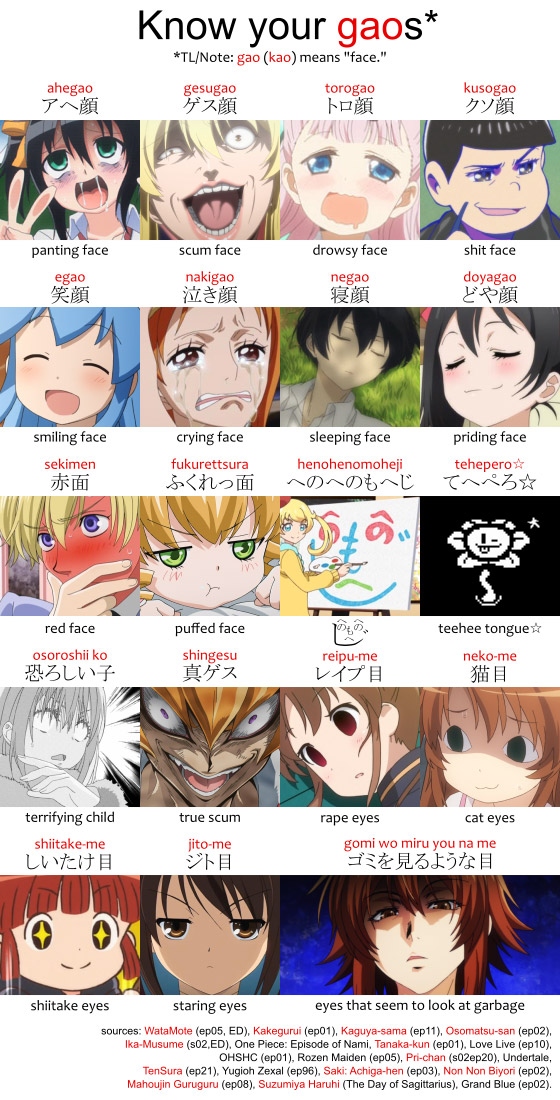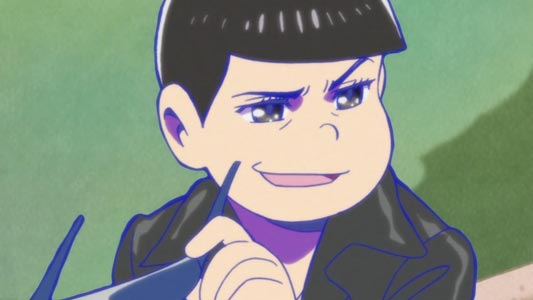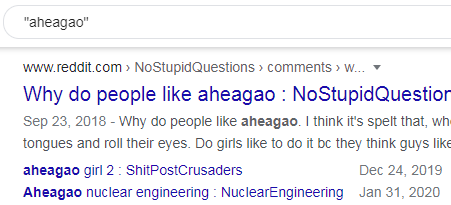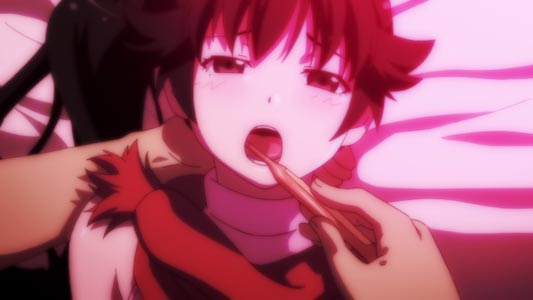In the English anime fandom, "know your gao's" or "know the faces" is a an NSFW meme template listing Japanese terms for four types of fetishized facial expressions: ahegao, gesugao, torogao and kusogao, plus an extra deemed the most important gao.
Unfortunately, the way the Japanese terms are labelled, or translated, in the often reposted meme is vague, inaccurate, and incorrect, so I made my own version of it, with literal translations and flowers, and I'm going to explain what the words are actually supposed to mean in Japanese.
Translations
In the often reposted meme template, the four terms are labelled (not translated) the following way:
- ahegao
(Fucked Silly) - gesugao
(Warped Evilness) - torogao
(Melting Pleasure) - kusogao
(Intoxicated Euphoria)
You don't need to know Japanese to figure out that there's no way four words ending with ~gao translate to four completely different phrases sharing nothing in common, so the labels above are NOT the actual meanings of the words.
The ~gao suffix is the word kao 顔, meaning "face," or "facial expression."
The ka か becomes ga が as a suffix due to rendaku 連濁.
This ~gao suffix can come up after basically anything and it's going to mean "face." Like:
- egao
笑顔
Smiling face. - nakigao
泣き顔
Crying face.- naku
泣く
To cry. (naki 泣き is the ren'youkei of this godan verb.)
- naku
- negao
寝顔
Sleeping face.- neru
寝る
To sleep. (ne 寝 is the ren'youkei of this ichidan verb.)
- neru
- doyagao
ドヤ顔
Proud face. Smug face.- doya
どや
Phrase used when being proud or showing off one's skills, achievements.
- doya
Then again, there are also terms for faces that don't end in ~gao, like:
- sekimen
赤面
Red (blushing) face. - fukurettsura
ふくれっ面
Face with "puffed" cheeks. So-called pouting face.
So it's not like the NSFW terms in the meme are special in any way:
- ahegao
アヘ顔
Panting face.- Despite it's literal meaning, generally NSFW, typically features eyes rolling up, putting one's tongue out, and double peace signs. Panting has, in fact, almost nothing to do with it.
- aheahe
あへあへ
*pant pant* (reduplicated onomatopoeia.) - Not to be confused with:
- ikigao
イキ顔
Orgasm face.- iku
いく
To go. (行く)
To die. (逝く)
To orgasm. (イく)
- iku
- gesugao
ゲス顔
Scum face.- Typically a scummy, evil-looking grin, fetishized because some people like sadistic girls, I guess.
- gesui
ゲスい
Scummy. Low-life. Dishonorable.
- torogao
トロ顔
Drowsy face. Groggy face.- Generally NSFW despite its literal meaning.
- me ga toron to suru
目がトロンとする
(For) eyes to feel heavy. - Not to be confused with:
- torokegao
蕩け顔
Melting face.- torokeru
蕩ける
To melt.
- torokeru
- A lot of people mistake torogao for the broader torokegao mostly because both words start with toro. Generally speaking, torogao are drawn with eyes half-closed.
"kusogao"
As far as I'm concerned, kusogao is NOT a Japanese term, it's a word someone added to the English meme that doesn't actually mean anything in Japanese.
To elaborate: kuso 糞 means "shit," so kusogao クソ顔 would be literally "shit face," which doesn't make a lot of sense.
Sure enough, kuso has other meanings. It can be used offensively, although in a way a bit different from how "shit" is used in English.
- kono kuso yarou!
このクソ野郎!
This shit man! (literally.)
[You bastard]!
And it can be used as an intensifying expletive, just like "fucking" in English:
- kuso kawaii
クソかわいい
Shit cute. (literally.)
[Fucking] cute.
But even taking in consideration these meanings that don't translate well literally to English, there's just no way to get the labelled sense "(Intoxicated Euphoria)" from kusogao in Japanese.
- Intoxicated means drunken (on alcohol) or drugged (on, well, drugs), by the way.
Instead, it's more likely that someone who doesn't speak Japanese took the expression "shit-faced," which means "drunken" in English, and translated it to Japanese literally, because the fact that kuso means "shit" is very easy to figure out even if you don't know the language.
- kuso! kuso! kuso!
クソ!クソ!クソ!
Shit! Shit! Shit! (something went wrong!)
Some sex-related terms that could be used instead, but that have nothing to do with facial expressions:
- suikan
酔姦
Drunken sex.- you
酔う
To be drunk.
- you
- kimeseku
キメセク
Drugged sex.- kimeru
キメる
To get high on drugs. (slang.)
- kimeru
Naturally, you can create terms for faces from the verbs above:
- yoigao
酔い顔
Drunken face. - kimegao
キメ顔
Drugged face.- This one doesn't really work because kimeru can also mean "to make a pose for a photo," so kimegao ends up meaning making a face for a photo, or something like that.
Incidentally, what people do call kusogao in Japanese is Karamatsu's kimegao.
Anime: Osomatsu-san おそ松さん (Episode 2)
- Context: Karamatsu constantly tries to show off, from the clothes he wears to the things he says. His brothers find it cringe.
- kakko-tsukeru
カッコつける
To try to make yourself look cool.
- kakko-tsukeru
- On episode 10, Osomatsu おそ松 discovers he built immunity to cringe lines after cringing too hard at Karamatsu's narcissistic tank-top and ridiculous eye contacts, both of which he qualified as kuso.
- kuso tanku-toppu to kuso karakon kuratta sei de, karada ni taisei ga tsuita-n-da!
クソタンクトップとクソカラコン喰らったせいで、体に耐性がついたんだ!
Because [I] took [your] shit tank-top and [your] shit color contacts, [my] body gained resistance!- kurau
食らう
To take [damage]. To receive [an attack, a blow]. (in this sentence, Karamatsu's shitty tank top and color contacts are cringeful blows.)
- kurau
However, just in case I'm wrong and someone in Japan actually uses the word the way it's described in the meme, I tried looking up who made the meme and put that word in there in first place.
Origin
Here comes a long and completely unnecessary survey on the origins of this meme and its variants.
Since they contain faces excerpted from what looks like actual pornography, I decided not to embed the images directly in this article. I rehosted them and will link to them instead and transcript.
Also, since these are memes, it's hard to tell when exactly they were made, so I'm using the earliest published date I could find.
- know-the-faces.jpg, the meme template.
- 2017-08-23, posted on Twitter..
- Know the faces: aheagao (fucked silly), gesugao (warped evilness), torogao (melting pleasure), kusogao (intoxicated euphoria) but most importantly: egao (a smiling face).
- Note: I tried reverse image searching only the top images, without the large egao at the bottom, but it didn't yield significant results, so I guess egao was part of this image right from the start.
- identify-your-gaos.jpg.
- 2017-07-06, post on Tumblr.
- Identify your gao's: torogao ("Melting" in pleasure), kusogao (Sh*t-faced), gesugao (Warped "evilness"), ahegao (F*cked silly). Anime was a mistake. Interpreted from Urbandictionary and other sources.
- know-your-gaos.jpg.
- 2015-02-20, posted on Tumblr.
- Know your gaos: identify them in the wild: アヘ顔 ahegao, トロ顔 torogao, ゲス顔 gesugao.
There you go.
The earliest variant included the words written in Japanese, so you know the poster actually knew Japanese, or knew how to copy-paste. Either way, there was no kusogao then, there was only three faces, because kusogao isn't a thing.
The second variant, now with kusogao, clearly has a lot of effort put in it: self-censoring, quotes around literal translations, and, most importantly: CITING SOURCES.
You can tell toro is supposed to be "melting," kuso is "sh*t," gesu is "evilness," and ahegao is... well, points for effort, I guess.
Then, one month later, the "know the faces" template shows up on the internet and it doesn't even spell ahegao right. This is clearly problematic, since now a lot of people on the internet misspell it "aheagao," because they learned the word from this meme.
And, also, it changed "sh*t-faced" to "intoxicated euphoria," which makes it harder to figure out where that mistranslation came from. Although some may argue the asterisk in sh*t makes it impossible to tell which word it was supposed to be.
And, thirdly, Urbandictionary is written by random users who may or mayn't know anything about Japanese, so it's not a reliable source for Japanese stuff in general. The Pixiv dictionary is also written by random users, but at least it's in Japanese.
This is what was written on Urbandictionary, posted by user "Gnashty Weeb," on 2015-10-22:[torogao - urbandictionary.com, accessed 2020-05-27]
Torogao is a facial expression that depicts a character figuratively “melting” in pleasure. Torogao’s definitions are a lot less rigid than ahegao’s, although drool and/or a blissed-out smile is common
Again: this definition is incorrect. It's impossible for me to blame the user, though, because "melting" would be my first guess, too. Even if you were born in Japan you could guess it wrong. It's just a very misleading term in general.
The toro in torogao doesn't mean "melting," but, instead, that the character looks drowsy, lethargic, so their eyes are drawn heavy, half-closed.
- torogao wa "torokegao" no isshu dewa aru ga, ikooru dewa nai.
トロ顔は「蕩け顔」の一種ではあるが、イコールではない。
Torogao is one kind of "melting face," but it's not equal. (i.e. it's not exact the same thing.) - genmitsu niwa "torogao = '{me ga toron to shita} kao' no ryakushou"
厳密には「トロ顔=“目がトロンとした顔”の略称」
Strictly: "torogao = an abbreviation of 'a face [with] {heavy eyes}'" - トロ顔 - dic.pixiv.net, accessed 2020-05-30.
For reference, this is what torogao actually looks like:
Anime: Nisemonogatari 偽物語 (Episode 8)
- torotoro
とろとろ
For a solid to melt, such that it become "sticky," "gooey."
Losing force. For a fire to weaken. For a train to slow down.
To feel sleepy. Drowsy. Groggy.- All usages of torotoro imply losing strength.
- dorodoro
どろどろ
Muddy.
By the way, did you notice that in the Urbandictionary post the word "melting" was quoted just like the meme? Interesting, isn't it?
But you know what's more interesting? You can click on somebody's username on Urbandictionary to see what else they've written.
The user "Gnashty Weeb" only ever wrote two posts, the other one posted on the very same day, 2015-10-22. This one:[gesugao - urbandictionary.com, accessed 2020-05-27]
Gesugao is any facial expression that is stylistically warped in a way meant to depict the “evilness” of a character.
This user did not write about ahegao or kusogao, but there was a post by someone else about ahegao on Urbandictionary, posted on 2010-06-11:[Author blurk - urbandictionary.com, accessed 2020-05-27]
japanese word for fucked silly
Well, now we know EXACTLY where the translations in that meme came from. There's no post about kusogao on Urbandictionary, so I guess this last one comes from one of those undisclosed "other sources."
Did the person who made the meme just made it up? But why would they make it up if they're citing sources? What do they have to gain in making up fake Japanese words for shit-faced faces?
Most likely, when they were doing their research on ~gaos, they probably saw a random internet user saying kusogao and thought it was legit. Hence why it's "other sources," i.e. "I read it on the internet."
In summary:
- kusogao is made up
- ahegao is not literally a "japanese word for fucked silly" but a term for a facial expression.
- gesugao is actually on the mark, but gesu isn't "evil," it's more like scum, low-life, dishonest (e.g. Ginrou 銀狼 from Dr. Stone is gesui, but not evil.).
- torogao, again, doesn't come from "melting."
I hope that cleared it up.




No comments: